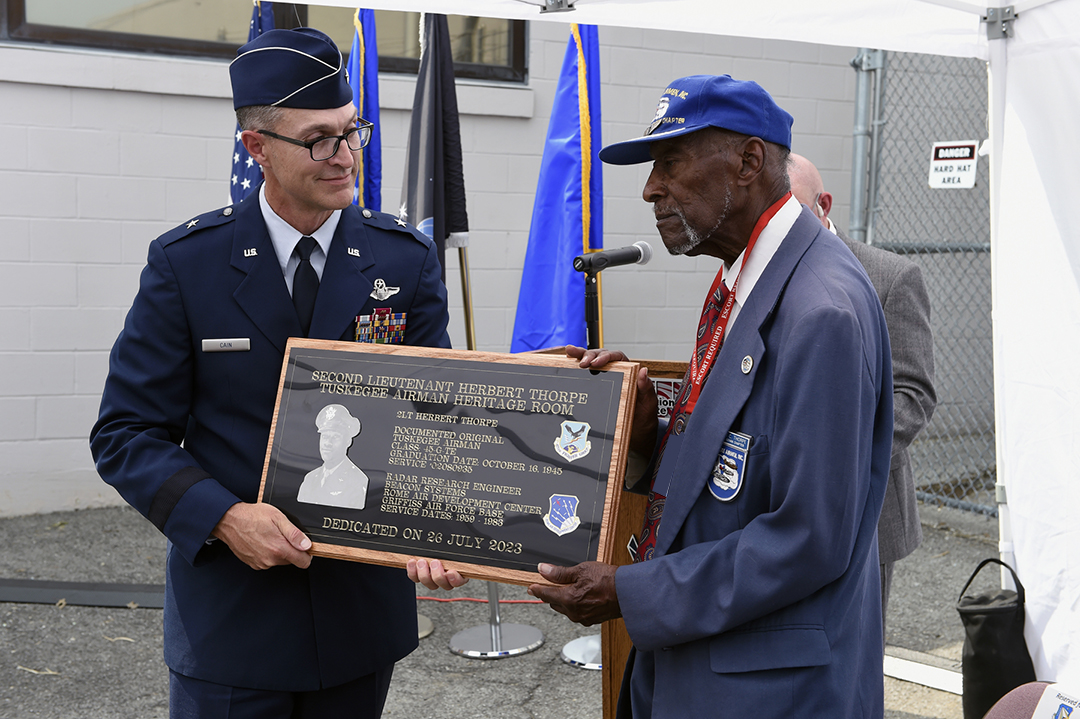ROME, N.Y. (AFRL) — The Air Force Research Laboratory, or AFRL, Information Directorate in Rome, New York, is pleased to announce the renaming and dedication of the Information Directorate Heritage Room in honor of Herbert Thorpe, a former Rome Air Development Center employee, Tuskegee Airman and veteran of World War II. The formal dedication occurred July 27, 2023, at the Information Directorate site.
Thorpe, now a spirited 100, attended the dedication event in person. He served as an Electrical Engineer at the former Rome Air Development Center from 1959 to 1983, when he retired.

Brig. Gen. Scott Cain presents a dedication plaque, to 2nd Lt. Herbert Thorpe, a Tuskegee Airman and former electrical engineer July 27, 2023. A room at the AFRL Information Directorate in Rome, New York was dedicated in Thorpe’s honor for his service to the nation and to the Air Force Research Laboratory. (U.S. Air Force photo/Albert Santacroce)
After a tour of the AFRL Information Directorate and some fond recollections of the work that he completed while at the Rome Air Development Center, Thorpe was received as the guest of honor at the dedication ceremony by Brig. Gen. Scott Cain, AFRL commander.
“Mr. Thorpe’s service reminds us that we are all part of something greater than ourselves and that we stand on the shoulders of giants, and they challenge us to keep adding to the proud legacy of our service,” said Cain.
In attendance were Thorpe family members, the Air Force Research Laboratory command staff, local civic leaders and employees of the AFRL Information Directorate.
Col. Fred Garcia, commander of the Information Directorate, commented, “The dedication of this room in honor of Mr. Thorpe is a visible reminder to our new Airmen, Guardians, and Science and Technical researchers that there will be many adversities that you will face in your life and as Mr. Thorpe has demonstrated to us all it is how you face them that gives you the fortitude to succeed.”
In 1942, Thorpe enlisted in the U.S. Army Reserve and attended U.S. Signal Corps School in Troy, N.Y., until Spring 1943. He began his active-duty service at basic military training in June 1943 at Ft. Dix, New Jersy, and Kearns Field, Utah. While in Utah, he applied and was accepted to Aviation Cadet School in December 1943. From Utah, he was sent to Keesler Field, Biloxi, Mississippi, in 1944, where he completed altitude testing. In January 1944, he transferred to Aviation Cadet School at Tuskegee Institute, Alabama. After completing Primary Flight School at the Institute, he was transferred to Basic Training Flight School at Tuskegee Army Air Field (TAAF) and was selected with others for multi-engine training. In mid-1944, he was transferred to Gunnery School at Tyndall Field, Florida, then to Bombardier/Navigator School at Midland Army Air Field, Texas.
Commissioned as a 2nd Lieutenant, Navigator/Bombardier, Dec. 30, 1944, in Midland, Texas, Thorpe returned to Tuskegee, began Advanced Flight Training school, and qualified as a B-25 (Twin-engine) pilot at TAAF in October 1945. He remained at TAAF and left the service in August 1946. Thorpe returned to Brooklyn to attend New York University under the GI Bill and graduated as an Electrical Engineer in 1953. From 1955-59, he was a Radar Systems Engineer at the Brooklyn Navy Yard.
At the Rome Air Development Center, Thorpe was instrumental in the research and creation of the Identification, Friend or Foe, or IFF, system which was designed for command and control. It uses a transponder that listens for an interrogation signal and then sends a response that identifies the broadcaster. IFF enables military and civilian air traffic control interrogation systems to identify aircraft, vehicles, or forces as friendly, as opposed to neutral or hostile, and to determine their bearing and range from the interrogator. IFF is used by both military and civilian aircraft.
Thorpe recalled those early research days at Rome and further expressed his appreciation for the dedication he would share with his brother. “I am honored to receive this dedication; however, I receive it with my brother, here in my heart,” he said.
Thorpe’s brother Richard was also a Tuskegee Airman. Richard Thorpe trained at the Tuskegee Institute before Herbert, and they flew together stateside. Richard was assigned as a replacement pilot with the Tuskegee Airmen and was instructed to report to Italy for combat. Unfortunately, Richard unexpectedly lost control of his aircraft during one of the orientation flights and died during that same training mission in 1945.
Herbert Thorpe and his brother received the Congressional Gold Medal in 2016 for service, and Herbert Thorpe was honored with the 1st New York State Dr. Martin Luther King, Jr. Humanitarian Award in 2012 and again in 2013 for his work in founding the Mohawk Valley Chapter of the NAACP. Thorpe received the Rome Historical Society 1777 Medal of Honor Award.

